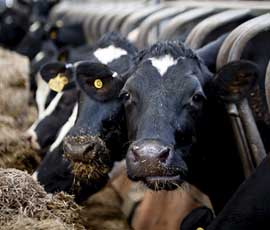Adult animals hit hard by Schmallenberg infection

Schmallenberg virus could be affecting adult animals far worse than previously thought, farmers and farm vets have warned.
The virus had been thought to cause only brief, mild or moderate symptoms in adult cattle, with much worse life-threatening effects in unborn cattle, sheep and goats.
But Tim Bebbington, from Castle Vets in Launceston, said the impact of the disease was not restricted to abortions and deformed foetuses.
“Every now and again several cows seem to go down quickly, with decreased milk production, scouring, low productivity and poor fertility. There’s no evidence of anything else wrong except Schmallenberg.”
He urged caution, however, as it was possible that other problems were being incorrectly attributed to Schmallenberg virus.
His practice had recently tested 360 animals from 60 beef and dairy farms across Devon and Cornwall – and only 15 tested negative for the disease.
Mr Bebbington has also received many reports of Schmallenberg in early lambing flocks, but the true picture could be far worse as the disease was still non-notifiable, he added.
Symptoms were also varied, including ewes carrying vast amounts of fluid with dead lambs. “It’s looking much worse than last year, but many farmers aren’t reporting it because there’s nothing they can do about it – it’s not a notifiable disease.”
The number of beef and dairy cows scanning barren had doubled since last year, to 18%, said Mr Bebbington, who admitted feeling “very nervous about the spring calving herds”.
A vaccine to protect animals against Schmallenberg virus could not come soon enough, he added.
David Horton milks 180 dairy cows at Dunsburgh Farm near Plymouth, and last year lost 15 heifers through unexplained illness.
“They just got weaker and weaker. There wasn’t a test for Schmallenberg then, but the heifers that survived tested positive this year and haven’t done at all well. Their calves appear brain dead and so far six have died.
“Nigel Gibbens, the chief veterinary officer, is still talking about this as a low impact disease but I disagree – it’s a catastrophe waiting to happen.”
At a meeting in Devon last week, DEFRA secretary Owen Paterson admitted he hadn’t heard about the effects on adult cattle.
But Peter Clarke, co-ordinator for the Farm Crisis Network in Cornwall, said some farmers’ milk yields had dropped by 50%, while other beef farmers had lost more than half their calves.
“This is having a devastating effect on sheep, beef and dairy farms. We have a perfect storm in the South West, with poor weather, poor crops, TB and now Schmallenberg. I don’t know how much more farmers can take – it’s very worrying.”
VIDEO: Schmallenberg disease – a sheep farmer’s story
Read more on lamb losses and take our survey
